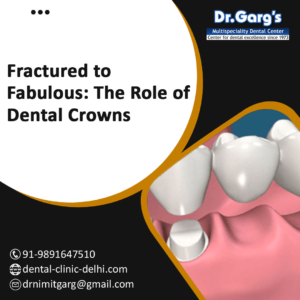From Fractured to Fabulous: The Role of Dental Crowns
When it comes to maintaining a healthy smile, sometimes our teeth need a little extra support. Dental crowns are a great solution for restoring both the function and appearance of damaged teeth. In this article, we’ll explore what dental crowns are, the different types available, their benefits and their needs.

What Are Dental Crowns?
Dental crowns are custom-made caps that encase a damaged, decayed, or weakened tooth. They can restore the tooth’s shape, size, strength, and appearance. Crowns are typically used in situations where a tooth cannot be completely restored with a filling alone, such as after a root canal treatment, in cases of significant wear, or to protect a tooth that is at risk of breaking.
Why Are Dental Crowns Needed?
A Dental Crown can be recommended for the following reasons:
- Protection: To protect a weak tooth from decay or breakage.
- Restoration: To restore a tooth that has been severely worn down or cracked.
- Support: To hold a dental bridge in place.
- Cosmetic Enhancement: To maintain the appearance of teeth that are discolored.
- Post-Root Canal Treatment: To strengthen a tooth that has undergone root canal therapy.
Types of Dental Crowns
Dental crowns come in several varieties, each with its advantages:
1. Porcelain Crowns
Made of pure ceramic material, they are known for their natural appearance. They are ideal for front teeth due to their aesthetic appeal.
2. Metal Crowns
Typically made from gold or other alloys, metal crowns are incredibly durable and suitable for back teeth to provide the essential strength. However, they are less visually appealing.
3. Porcelain-Fused-to-Metal (PFM) Crowns
Combining the durability of metal with the aesthetics of porcelain, PFM crowns offer a great balance. Their versatility allows them to be used for both front and back teeth.
4. Zirconia Crowns
They are made from a strong ceramic material, zirconia crowns are both durable and aesthetically pleasing. They can be used for any tooth and are known for their strength.
Benefits of Dental Crowns
- Strength and Durability: Crowns provide additional support to damaged teeth, allowing them to function normally.
- Natural Appearance: Modern materials can closely mimic the look of natural teeth, enhancing your smile and confidence.
- Long-lasting Solution: Dental crowns tend to last many years with proper care, making them a cost-effective long term option.
- Improved Functionality: Crowns restore the ability to chew and speak normally without discomfort and allow you to enjoy your favorite food.
Aftercare for Dental Crowns
After receiving a dental crown, it’s essential to follow proper care practices:
- Brush and floss regularly to keep the area around the crown clean.
- Make sure to avoid hard foods that might damage the crown.
- Visit your dentist for regular check-ups to monitor the crown’s condition.
Conclusion
Dental crowns are a reliable solution for restoring damaged teeth and enhancing your smile. With various types available, you can find a crown that meets both your functional and aesthetic needs. Ready to explore your options for dental crowns? Contact Dr. Garg’s Multispeciality Dental Center to schedule a consultation today!

Leave a Reply
Want to join the discussion?Feel free to contribute!